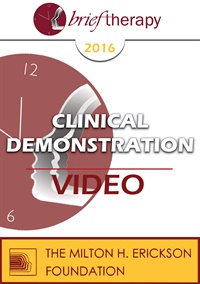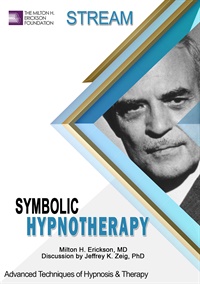
Credit available - Click Here for more information
- Average Rating:
- Not yet rated
- Topic Areas:
- Hypnosis | Advanced Techniques of Hypnosis & Therapy | Continuing Education | Ericksonian Hypnosis and Therapy Techniques | Hypnotherapy | Milton Erickson | Communication | Metaphors
- Categories:
- Advanced Techniques of Hypnosis & Therapy | Featured | Training Videos | Online Continuing Education | Milton H. Erickson Collections
- Faculty:
- Jeffrey Zeig, PhD | Milton H. Erickson, MD
- Course Levels:
- Master Degree or Higher in Health-Related Field
- Duration:
- 02:38:00
- Format:
- Audio and Video
- Original Program Date:
- Dec 31, 1977
- Short Description:
- This training tool contains segments of hypnotherapy conducted by Erickson, with the same subject, on two consecutive days in 1978. Erickson demonstrates how symbols may be used as metaphoric forms of communication to foster new ideas and understandings. Zeig discusses Erickson’s technique.
- Price:
- $75.00 - Base Price

- Average Rating:
- Not yet rated
- Topic Areas:
- Utilization | Clinical Demonstrations | Psychotherapy | Therapist Development | Intimacy | Psychosomatics | Communication
- Bundle(s):
- Art of Psychotherapy - Utilization Series
- Categories:
- Art of Psychotherapy
- Faculty:
- Jeffrey Zeig, PhD
- Course Levels:
- Master Degree or Higher in Health-Related Field
- Duration:
- 2 Hours 22 Minutes
- Format:
- Audio and Video
- Original Program Date:
- Jul 12, 2020
- Short Description:
- For the final class in the Utilization series, Patricia joins us to discuss her preference for being in control, and how that relates to her struggles with intimacy. She also requests help alleviating a psychosomatic response from an earlier trauma. Dr. Zeig uses an interpersonal approach to this session, utilizing verbal and body language techniques to help communicate complex concepts. Zeig establishes the theme of appreciate as the through-line for this session.
- Price:
- $79.00 - Base Price
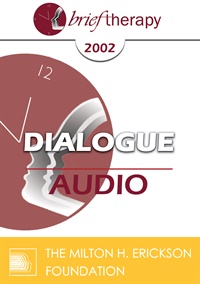
- Average Rating:
- Not yet rated
- Topic Areas:
- Dialogues | Couples Therapy | Cognitive Behavior Therapy (CBT) | Solution Oriented Approach | Communication
- Categories:
- Brief Therapy Conference | Brief Therapy Conference 2002 | Pioneers in Couples and Family Therapy
- Faculty:
- Arthur Freeman, EdD | Michele Weiner-Davis, LCSW
- Duration:
- 1:01:29
- Format:
- Audio Only
- Original Program Date:
- Dec 13, 2002
- Short Description:
- Two brief therapy models—cognitive-behavioral and solution-focused—are explored for their ability to jump-start change in distressed couples. The presenters consider how early signs of improvement, hope-building, and collaborative strategies support movement toward repair. The conversation also addresses clinical judgment around domestic violence, therapist alignment, and working within complex systems.
- Price:
- $15.00 - Base Price
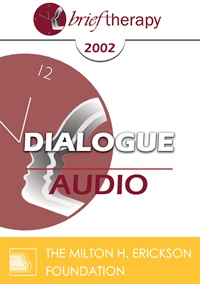
- Average Rating:
- Not yet rated
- Topic Areas:
- Dialogues | Love | Relationships | Brief Therapy | Communication
- Categories:
- Brief Therapy Conference | Brief Therapy Conference 2002
- Faculty:
- Insoo Kim Berg, MSSW
- Duration:
- 1:00:54
- Format:
- Audio Only
- Original Program Date:
- Dec 13, 2002
- Short Description:
- What actually creates change in love relationships? In this lively dialogue, Berg and Love compare solution-focused and neurobiological perspectives on couples work. Through case examples and audience consultation, they explore how hope, small behavioral shifts, expectation, and brain science intersect in real clinical practice. The conversation offers practical ways to interrupt stuck patterns and help partners become healing agents for one another.
- Price:
- $15.00 - Base Price
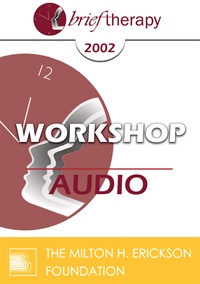
- Average Rating:
- Not yet rated
- Topic Areas:
- Workshops | Children and Adolescent Therapy | Communication | Brief Therapy
- Categories:
- Brief Therapy Conference | Brief Therapy Conference 2002
- Faculty:
- Insoo Kim Berg, MSSW
- Duration:
- 2:12:52
- Format:
- Audio Only
- Original Program Date:
- Dec 15, 2002
- Short Description:
- Working with children calls for a different kind of listening. In this lively workshop, Berg demonstrates how solution-focused principles translate into play, scaling tools, compliments, family sessions, and creative exercises that engage even very young clients. Through vivid case examples, she shows how to involve parents, shift attention to strengths, and use simple materials to help children articulate solutions in their own language.
- Price:
- $15.00 - Base Price
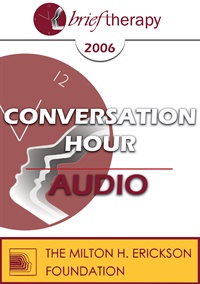
- Average Rating:
- Not yet rated
- Topic Areas:
- Conversation Hours | Communication | Brief Therapy | Ericksonian Hypnosis and Therapy Techniques
- Categories:
- Brief Therapy Conference | Brief Therapy Conference 2006
- Faculty:
- Betty Alice Erickson, MS, LPC, LMFT
- Duration:
- 1:01:53
- Format:
- Audio Only
- Original Program Date:
- Dec 08, 2006
- Short Description:
- BT06 Conversation Hour 03 - Effective Communication for Therapy - Betty Alice Erickson, MS, LPC, LMFT
- Price:
- $15.00 - Base Price
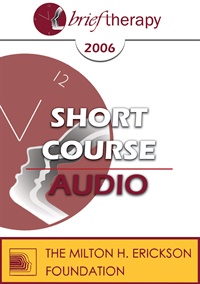
- Average Rating:
- Not yet rated
- Topic Areas:
- Short Courses | Addiction | Brief Therapy | Communication | Mind-Body | Utilization
- Categories:
- Brief Therapy Conference | Brief Therapy Conference 2006
- Faculty:
- Bart Walsh, MSW
- Duration:
- 1:19:30
- Format:
- Audio Only
- Original Program Date:
- Dec 07, 2006
- Short Description:
- This presentation poses a brief substance abuse treatment which acknowledges and accommodates the personal needs being addressed by substance use, bypasses perceived resistance and employs the essence of idiosyncratic psychobiological learning to achieve a body-mind gestalt complementary to the client's sobriety. Client self-empowerment and relapse prevention are built into the intervention. This method develops a safe framework for addressing any subsequent mental health themes directly or indirectly related to substance misuse. A particular form of body language known as ideomotor signaling is established in this procedure.
- Price:
- $15.00 - Base Price
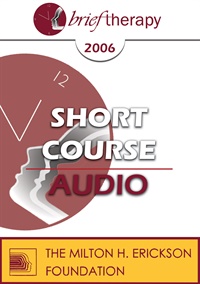
- Average Rating:
- Not yet rated
- Topic Areas:
- Short Courses | Reframing | Reality Therapy | Communication | Brief Therapy
- Categories:
- Brief Therapy Conference | Brief Therapy Conference 2006
- Faculty:
- Robert Wubbolding, EdD
- Duration:
- 1:19:30
- Format:
- Audio Only
- Original Program Date:
- Dec 07, 2006
- Short Description:
- The daunting task of leading clients from a disempowering sense of external control to an actualizing sense of inner control becomes doable by helping them reframe their behavior from actions to language, i.e., seeing actions as an attempt to send a message or a signal to the world around them. This practical idea will be illustrated in role-play demonstrations of the WDEP system: Wants, Doing (or behavior as language), self-Evaluation, and action Planning.
- Price:
- $15.00 - Base Price
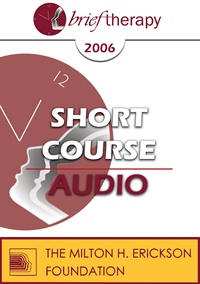
- Average Rating:
- Not yet rated
- Topic Areas:
- Short Courses | Anger | Anxiety | Brief Therapy | Communication
- Categories:
- Brief Therapy Conference | Brief Therapy Conference 2006
- Faculty:
- Kevin Humphrey, MA | Allan Sargent | Marilyn Sargent
- Duration:
- 1:15:09
- Format:
- Audio Only
- Original Program Date:
- Dec 07, 2006
- Short Description:
- Does your client have anyone in their life that can "get them," so that they feel like running away or punching the person out? What if you had the hemispheric integration tool that can change their initial response to that person or even to a situation? When clients remain centered, they will influence and set boundaries that will actually change the dynamics of the relationship. When your client is different the interactions have to evolve.
- Price:
- $15.00 - Base Price
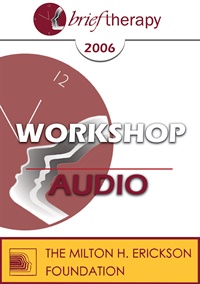
- Average Rating:
- Not yet rated
- Topic Areas:
- Workshops | Brief Therapy | Communication | Femininity | Masculinity | Couples Therapy | Relationships
- Categories:
- Brief Therapy Conference | Brief Therapy Conference 2006
- Faculty:
- Pat Love, EdD
- Duration:
- 2:29:51
- Format:
- Audio Only
- Original Program Date:
- Dec 10, 2006
- Short Description:
- A relationship can fail without conscious intent unless you understand the two major forces underlying resentment and alienation. Come learn how one shift in perception and three simple techniques can create harmony and happiness at home and work. This workshop will include lecture, video, practical handouts, experiential exercise and discussion.
- Price:
- $15.00 - Base Price
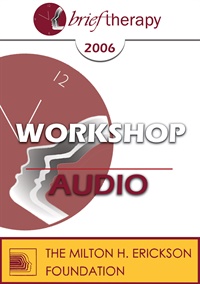
- Average Rating:
- Not yet rated
- Topic Areas:
- Workshops | Brief Therapy | Communication | Unconscious Processes | Clinical Demonstrations
- Categories:
- Brief Therapy Conference | Brief Therapy Conference 2006
- Faculty:
- Steve Andreas, MA, NLP
- Duration:
- 1:43:46
- Format:
- Audio Only
- Original Program Date:
- Dec 10, 2006
- Short Description:
- This extended workshop explores how the questions people habitually ask themselves quietly organize attention, emotion, and behavior across contexts. Through live demonstrations and guided experiments, it shows how refining a single core question can shift perception, increase flexibility, and support lasting change by orienting clients toward present-moment experience, choice, and engagement.
- Price:
- $15.00 - Base Price
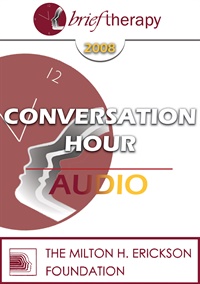
- Average Rating:
- Not yet rated
- Topic Areas:
- Conversation Hours | Couples Therapy | Communication
- Categories:
- Brief Therapy Conference | Brief Therapy Conference 2008 | Pioneers in Couples and Family Therapy
- Faculty:
- Michele Weiner-Davis, LCSW
- Duration:
- 1:06:57
- Format:
- Audio Only
- Original Program Date:
- Dec 13, 2008
- Short Description:
- Infidelity doesn’t have to mean the end of a relationship. This session explores how couples can rebuild after betrayal by restoring trust, validating pain on both sides, and reconnecting with their shared foundation. Practical strategies are offered for navigating complex dynamics, including pornography use, while adapting interventions to fit each couple’s unique path to repair.
- Price:
- $15.00 - Base Price
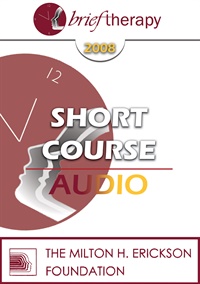
- Average Rating:
- Not yet rated
- Topic Areas:
- Short Courses | Brief Therapy | Communication | Stress | Therapist Development
- Categories:
- Brief Therapy Conference | Brief Therapy Conference 2008
- Faculty:
- Seth Kadish, PsyD
- Duration:
- 1:12:50
- Format:
- Audio Only
- Original Program Date:
- Dec 11, 2008
- Short Description:
- The "Pointing Out Patterns" approach is a three-phase, nine-step process, which addresses the negative patterns of thinking and behavior that cause clients intrapsychic and interpersonal stress. The clinician rapidly observes and reveals these negative patterns, e.g., entitlement, intimidation, people-pleasing, etc., to the client, in a caring, supportive and straightforward manner, and assists the client in quickly diminishing, or eradicating negative patterns of thought and behavior.
- Price:
- $15.00 - Base Price
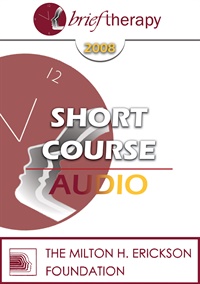
- Average Rating:
- Not yet rated
- Topic Areas:
- Short Courses | Brief Therapy | Communication | Ericksonian Hypnosis and Therapy Techniques | Hypnosis | Language of Hypnosis
- Categories:
- Brief Therapy Conference | Brief Therapy Conference 2008
- Faculty:
- Kate Cohen-Posey, MS
- Duration:
- 1:30:12
- Format:
- Audio Only
- Original Program Date:
- Dec 11, 2008
- Short Description:
- A person may say, "Don't ever . . . lie to me again!" or "You can . . . always tell me the truth." In either case, hypnotic language has been used to evoke undesirable or desirable behavior. This workshop will take Ericksonian linguistic patterns and export them into everyday environments. Exercises, role-plays, and brain storming will show how to make lasting changes in speech habits when addressing resistant family members and co-workers.
- Price:
- $15.00 - Base Price

- Average Rating:
- Not yet rated
- Topic Areas:
- Short Courses | Brief Therapy | Children and Adolescent Therapy | Communication | Metaphors
- Categories:
- Brief Therapy Conference | Brief Therapy Conference 2008
- Faculty:
- Marilyn Wedge
- Duration:
- 1:23:15
- Format:
- Audio Only
- Original Program Date:
- Dec 11, 2008
- Short Description:
- The language a therapist uses to conceptualize and treat a problem determines whether or not that problem can be resolved effectively. Plato's story of the cave, where the inhabitants see only shadows, is a useful metaphor for how the language of therapy can generate either confusion or clarity. This workshop will teach a method of effectively treating severe problems of children and adolescents, using an invariant opening question, strategic dialogue and metaphorical techniques.
- Price:
- $15.00 - Base Price
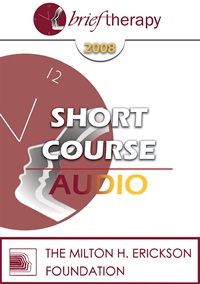
- Average Rating:
- Not yet rated
- Topic Areas:
- Short Courses | Communication | Metaphors | Brief Therapy | Reality Therapy
- Categories:
- Brief Therapy Conference | Brief Therapy Conference 2008
- Faculty:
- Robert Wubbolding, EdD
- Duration:
- 1:25:22
- Format:
- Audio Only
- Original Program Date:
- Dec 11, 2008
- Short Description:
- Practicality and usability occupy the center of the reality therapy WDEP process. This workshop emphasizes advanced application through the use of metaphors designed to help clients determine the realistic attainability of their wants and the efficacy of their behaviors. Adrian Monk and Lieutenant Columbo provide assistance to therapist and client as they walk the path, untangle the web, and bring the unknown to light.
- Price:
- $15.00 - Base Price
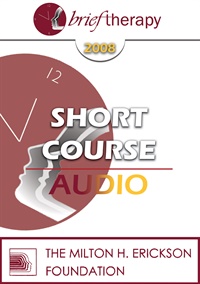
- Average Rating:
- Not yet rated
- Topic Areas:
- Short Courses | Addiction | Brief Therapy | Communication | Mind-Body | Utilization
- Categories:
- Brief Therapy Conference | Brief Therapy Conference 2008
- Faculty:
- Bart Walsh, MSW
- Duration:
- 1:24:25
- Format:
- Audio Only
- Original Program Date:
- Dec 11, 2008
- Short Description:
- This presentation poses a substance abuse treatment which acknowledges and accommodates the personal needs being addressed by substance use, bypasses perceived resistance and employs idiosyncratic psycho-biological learning to achieve a body-mind Gestalt complementary to the client's sobriety. Client self-empowerment and relapse prevention are built into the intervention. This method develops a safe framework for addressing any subsequent mental health themes directly or indirectly related to substance misuse. A simple form of bodymind communication, known as ideomotor questioning, is employed in this procedure. Because this is a new strategy, fundamental information applicable to all levels of professional experience, will be provided.
- Price:
- $15.00 - Base Price
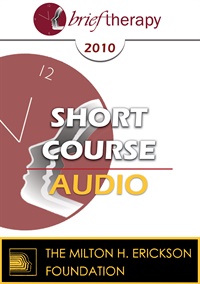
- Average Rating:
- Not yet rated
- Topic Areas:
- Addiction | Short Courses | Brief Therapy | Communication | Mind-Body | Utilization
- Categories:
- Brief Therapy Conference | Brief Therapy Conference 2010
- Faculty:
- Bart Walsh, MSW
- Duration:
- 1:32:27
- Format:
- Audio Only
- Original Program Date:
- Dec 09, 2010
- Short Description:
- This presentation poses a substance abuse treatment which acknowledges and accommodates the personal needs being addressed by substance use, bypasses perceived resistance and employs idiosyncratic psycho-biological learning to achieve a mind-body gestalt complementary to the client’s sobriety. Client self-empowerment and relapse prevention are built into the intervention. This method develops a safe framework for addressing any subsequent mental health themes directly or indirectly related to substance misuse. A simple form of mind-body communication known as ideomotor questioning is employed in this procedure. Because this is a new strategy, fundamental information applicable to all levels of professional experience will be provided.
- Price:
- $15.00 - Base Price
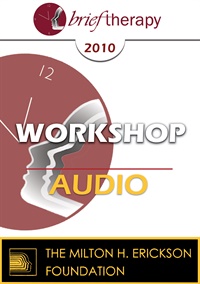
- Average Rating:
- Not yet rated
- Topic Areas:
- Workshops | Communication | Behavioral Therapy
- Categories:
- Brief Therapy Conference | Brief Therapy Conference 2010 | Pioneers in Couples and Family Therapy
- Faculty:
- Ellyn Bader, PhD
- Duration:
- 1:59:31
- Format:
- Audio Only
- Original Program Date:
- Dec 12, 2010
- Short Description:
- Discover the Initiator-Inquirer Process: A transformative approach to couples therapy that goes beyond communication skills. Learn to help couples uncover deeper relational dynamics, express vulnerabilities without blame, and develop genuine empathy. Includes practical techniques for working with complex relationship challenges, applicable in both long-term and brief therapy settings.
- Price:
- $15.00 - Base Price
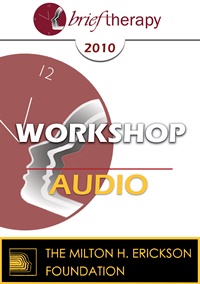
- Average Rating:
- Not yet rated
- Topic Areas:
- Workshops | Brief Therapy | Communication | Hypnosis
- Categories:
- Brief Therapy Conference | Brief Therapy Conference 2010
- Faculty:
- Norma Barretta, PhD
- Duration:
- 2:42:06
- Format:
- Audio Only
- Original Program Date:
- Dec 12, 2010
- Short Description:
- This workshop explores how sharpening sensory acuity can make brief therapy more precise, responsive, and lasting. Participants learn to track subtle shifts in posture, breathing, facial expression, tone, and physiology, and to use those cues to guide timing, language, and intervention moment by moment. Through demonstrations, exercises, and clinical stories drawn from Ericksonian work, the session shows how careful observation turns technique into artistry, helping therapists interrupt stuck patterns and respond to what clients are actually communicating in real time.
- Price:
- $15.00 - Base Price
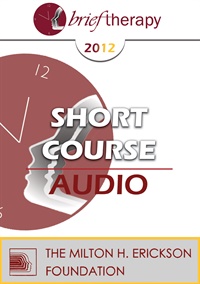
- Average Rating:
- Not yet rated
- Topic Areas:
- Short Courses | Communication | Multicultural
- Categories:
- Brief Therapy Conference | Brief Therapy Conference 2012
- Faculty:
- Sherri Reynolds
- Duration:
- 1:34:45
- Format:
- Audio Only
- Original Program Date:
- Dec 09, 2012
- Short Description:
- BT12 Short Course 41 – How Culture Impacts Communication – Sherri Reynolds, MA, MFT Participants will identify and analyze culture using 10 dimensions to break through communication barriers. Participants will learn to assess their own and their clients’ cultural styles of communication. Participants will also learn to apply specific techniques to facilitate more effective communication with clients, allowing them to establish lasting trust and develop a deeper relationship with clients from diverse cultures.
- Price:
- $15.00 - Base Price
Tags: Multi-Cultural
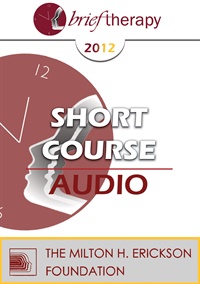
- Average Rating:
- Not yet rated
- Topic Areas:
- Anxiety | Depression | Short Courses | Communication | Neurobiology
- Categories:
- Brief Therapy Conference | Brief Therapy Conference 2012
- Faculty:
- Bart Walsh, MSW
- Duration:
- 1:55:20
- Format:
- Audio Only
- Original Program Date:
- Dec 09, 2012
- Short Description:
- BT12 Short Course 51 – Effective Management of Chronic Anxiety and Depression with Essential Neurobiological Communication – Bart Walsh, MSW Learn how to access deep levels of mind-body functioning for remission of chronic anxiety and depression. Essential neurobiological communication (ENBC) incorporates a form of body language known as ideomotor signaling. Affected individuals learn to fully manage these chronic conditions. Resolve past emotion using a noninvasive protocol integrating a progressive ratification sequence for grounding emotional adjustments in thought, perception and behavior.
- Price:
- $15.00 - Base Price
Tags: Anxiety Depression
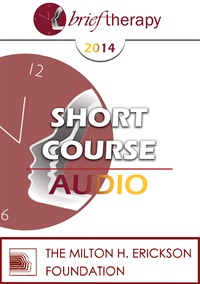
- Average Rating:
- Not yet rated
- Topic Areas:
- Anxiety | Depression | Short Courses | Communication | Neurobiology | Brief Therapy | Trauma
- Categories:
- Brief Therapy Conference | Brief Therapy Conference 2014
- Faculty:
- Bart Walsh, MSW
- Duration:
- 1:31:46
- Format:
- Audio Only
- Original Program Date:
- Dec 11, 2014
- Short Description:
- There are multiple explanations and theories to explain the creation of anxiety, depression and trauma creation. Many emphasize pathology, permanence of conditions and use multi-syllable words and encourage medical interventions to treat symptoms. This paradigm is often not effective for improving the lives of individuals treated. This course looks at non-medical underpinnings to conceptualize the creation of anxiety, depression and trauma. This conceptualization when understood by the clinician; makes them a better facilitator and co-creator in the treatment process. A natural, holistic understanding also empowers the clinician and client and moves all parties involved closer to health.
- Price:
- $15.00 - Base Price
- Average Rating:
- Not yet rated
- Topic Areas:
- Clinical Demonstrations | Brief Therapy | Communication | Family Therapy | Relationships
- Categories:
- Brief Therapy Conference | Brief Therapy Conference 2016
- Faculty:
- Wendel Ray, PhD
- Course Levels:
- Master Degree or Higher in Health-Related Field
- Duration:
- 1:02:59
- Format:
- Audio and Video
- Original Program Date:
- Dec 10, 2016
- Short Description:
- The Communication Theory Based Family and Brief Therapy developed by the Palo Alto Group pioneered specific techniques for quickly comprehending relationship and contextual commands and constraints inherent in how people communication about the problem they are experiencing. This demonstration will reveal how a therapist uses listening and joining skills to identify and use messages implied about the relationship nexus of which the problem is a part to join and engender constructive change.
- Price:
-
Sale is $29.00
price reduced from Base Price - $59.00
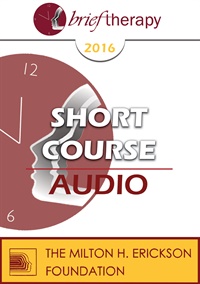
- Average Rating:
- Not yet rated
- Topic Areas:
- Short Courses | Art and Creativity | Communication | Experiential Therapy
- Categories:
- Brief Therapy Conference | Brief Therapy Conference 2016
- Faculty:
- Susan Pinco, PhD
- Duration:
- 1:23:35
- Format:
- Audio Only
- Original Program Date:
- Dec 08, 2016
- Short Description:
- We live in exciting times where ever expanding understandings of the way that our mind-bodies work ignite infinite possibilities. Come unpack these concepts in this experiential workshop.
- Price:
- $15.00 - Base Price


